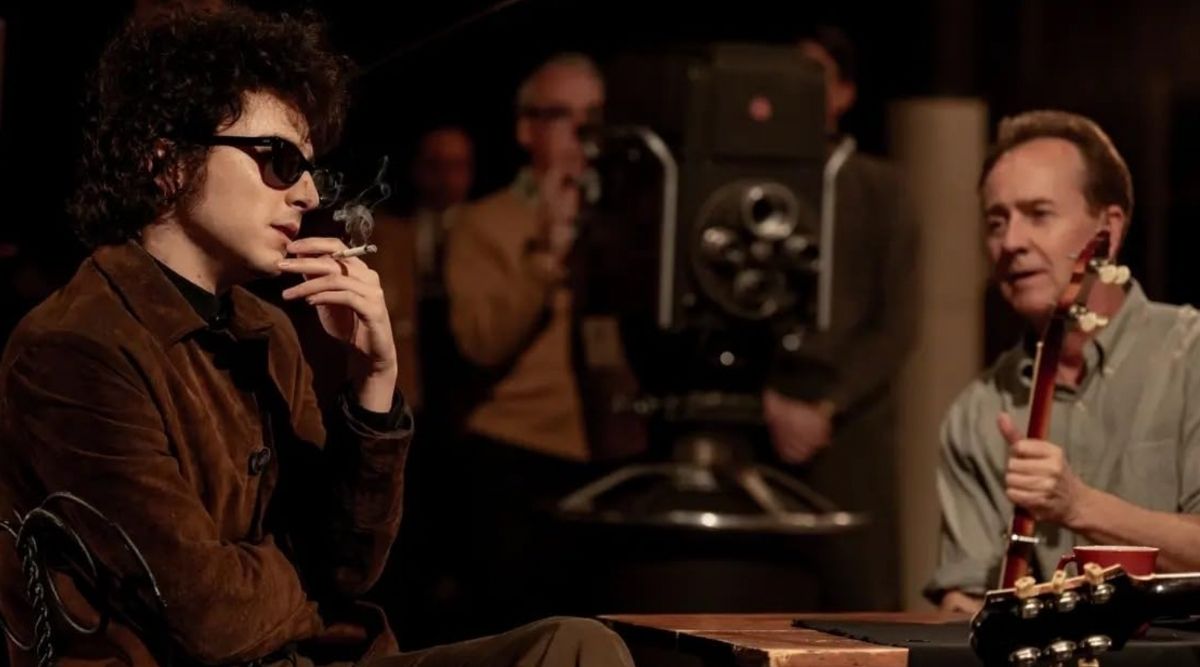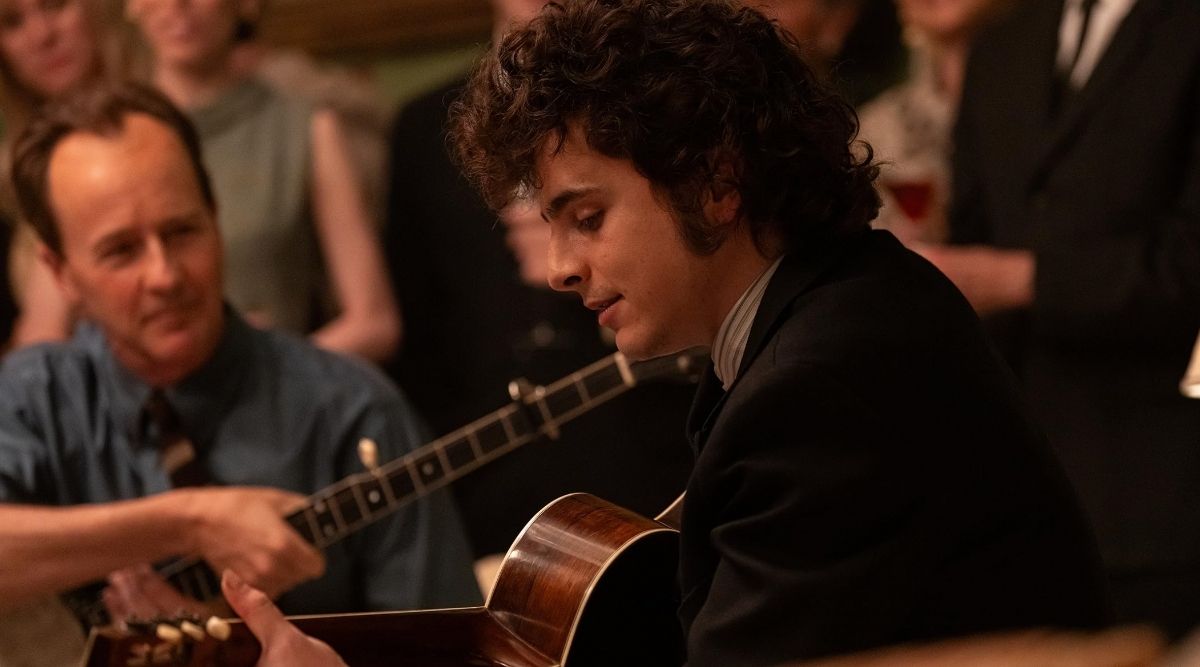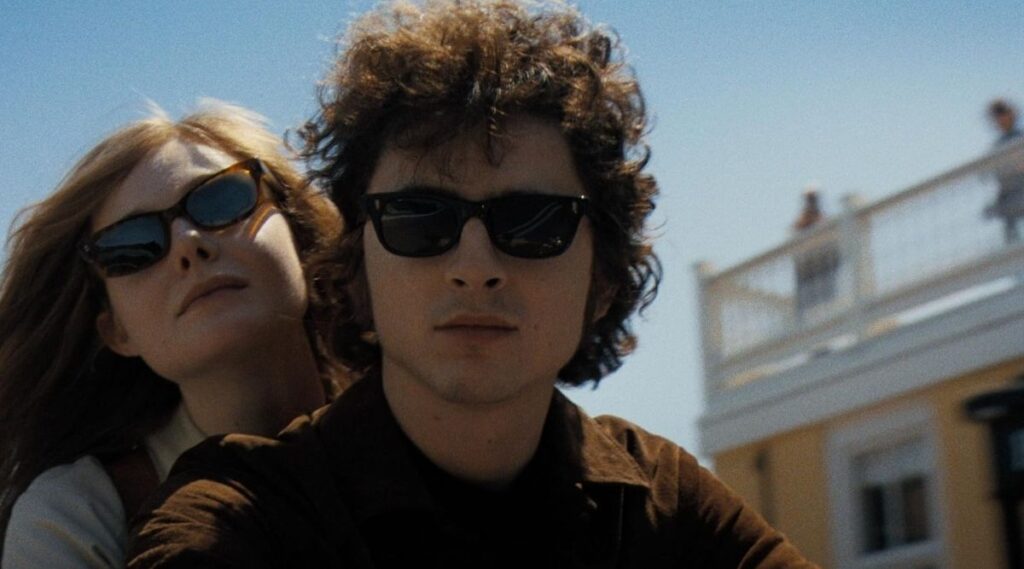I am not a Bob Dylan fan. Of course, I appreciate his music and know where the line “A complete unknown” comes from. But everything I know about the man is through osmosis. Despite my deep personal roots in folk music as a professional musician, I have never once considered Bob Dylan a folk musician in the lineage of Woody Guthry and Pete Seeger until James Mangold’s A Complete Unkown (2024).
Which, to the movie’s credit, is a little bit of the point. Bob Dylan is a famously enigmatic man and musician whose most prolific work came at a confluence of influences. But how many roads must a movie walk down before it can figure out what it wants to be? The answer, my friend, is clearly still blowing in the wind.
A Complete Unknown is the Avengers of folk musicians, in a bad way.

A Complete Unknown attempts to weave together the different strands of Dylan’s personal and professional life, partially fictionalized, to build an intentionally still-hazy portrait of one of the most important musicians of all time. But modern filmmaking mistakes and an assumption that the audience already knows the Bob Dylan basics hold this film back from being much more than a fine film for Dylan fans—and maybe a good film for Seeger fans.
I am a Pete Seeger fan. I owe everything I am as a musician and more to Pete Seeger’s unmatched power to collect people’s stories from far and wide and translate emotion into song and song into action. Edward Norton plays Seeger so convincingly. He sounds exactly like Seeger did and has a demeanor that is exactly how I’ve always imagined my hero. The most successful aspect of A Complete Unknown is the tension between Seeger, Bob Dylan (Timothée Chalamet), and their generations of musicians in the build-up to its disastrous conclusion.
But I am fortunate to have a niche knowledge of American folk music lore before watching this movie. From the moment it begins, A Complete Unknown expects the audience to know exactly already who Pete Seeger is, let alone the grandfather of the modern folk movement, Woodie Guthry (Scoot McNairy), or perhaps at least a little more likely, the incomparable Joan Baez (Monica Barbaro). How the first fact of A Complete Unknown is built feels like the filmmakers are trying to build an Avengers of folk musicians without offering any of the necessary origin stories first.
Getting Bob Dylan right in A Complete Unknown.

Where Seeger is a convincing character, Dylan is not. Chalamet is, of course, representing a man who is famously hard to read. But his portrayal, like in so many of his roles, lacks the emotional energy required to convince that music moves him in any way more than mechanically. He’s always writing down song lyrics every hour of the day, but he’s also stone-cold about everything. In the parts of the movie where you might finally catch a glimpse of sadness in his eyes, he’s wearing his iconic sunglasses to hide it.
It’s also unclear what A Complete Unknown’s two love interests see in him besides a prolific musician. Dylan ping-pongs between Sylvie (Elle Fanning), an amalgamation of multiple real-life lovers, and Baez without consequence. Neither of them nor Toshi Seeger (Eriko Hatsune) ever feels like they get to exist outside of their relationships with their men.
They’re usually just lenses through which to attempt to understand Dylan better, save for the one moment each where they get to stand up to him. While it’s surely an inadvertent testament to the way Dylan treated women at this point in his life, it’s quite unfair to all three women, given they are all indomitable forces in the folk movement themselves.
The hardest part of making a Bob Dylan biopic was always going to be the music. Dylan has such a unique voice that any attempt to recreate it could verge on either mockery or imitation. For many of the songs in A Complete Unknown, Chalamet is too crisp of a singer to match Dylan’s timbre. He’s more successful in others.
But the soundtrack is muted across the board. Whether it’s the way certain songs are mixed, the tempo, the instrumentation, or just the reality of modern recording technology, it’s impossible to listen without wishing it was the original version instead.
A Complete Unknown makes all the modern Mistakes.

A Complete Unknown isn’t exactly an unpleasant experience, but because it assumes that the audience already knows the basics of Bob Dylan’s story, it never fully captures the feeling of an enigmatic but charismatic master of his craft. The superior music biopics of 2024, Piece by Piece and Better Man, succeed because they both completely break the tired formula.
Yes, they both use absurd and unexpected animated forms to do so, but nonetheless, they’re original, creative, and by far more triumphant. A Complete Unknown not only feels like every other music biopic ever, but it also feels irritatingly like a modern movie monstrosity overfilled with Easter eggs and cameos.
There are many moments where a hotel sign or trinket is lampshaded because it will later be part of an iconic recording. If not that, a character appears, and the audience is supposed to be thrilled like their favorite superhero made a cameo, or an awkward conversation is had where Dylan fumbles, explaining how Dylan isn’t his real last name. It’s an aggravating modern movie-going experience in that way. It’s made part character-building device, part examination of internalized antisemitism, and part easter egg that just doesn’t mix together.
If you’re a Pete Seeger fan, though, A Complete Unknown has some merits. The tension between generations of folk musicians is tense and well-investigated. It just would be nice if Joan Baez got to be a part of the conversation herself instead of being mere fodder for Bob Dylan’s emotional immaturity.
A Complete Unknown is streaming now on Hulu.
A Complete Unknown was nominated for eight Academy Awards.
A Complete Unknown
-
Rating - 6/106/10
TL;DR
If you’re a Pete Seeger fan, A Complete Unknown has some merits. The tension between generations of folk musicians is tense and well-investigated. It just would be nice if Joan Baez got to be a part of the conversation herself instead of being mere fodder for Bob Dylan’s emotional immaturity.







